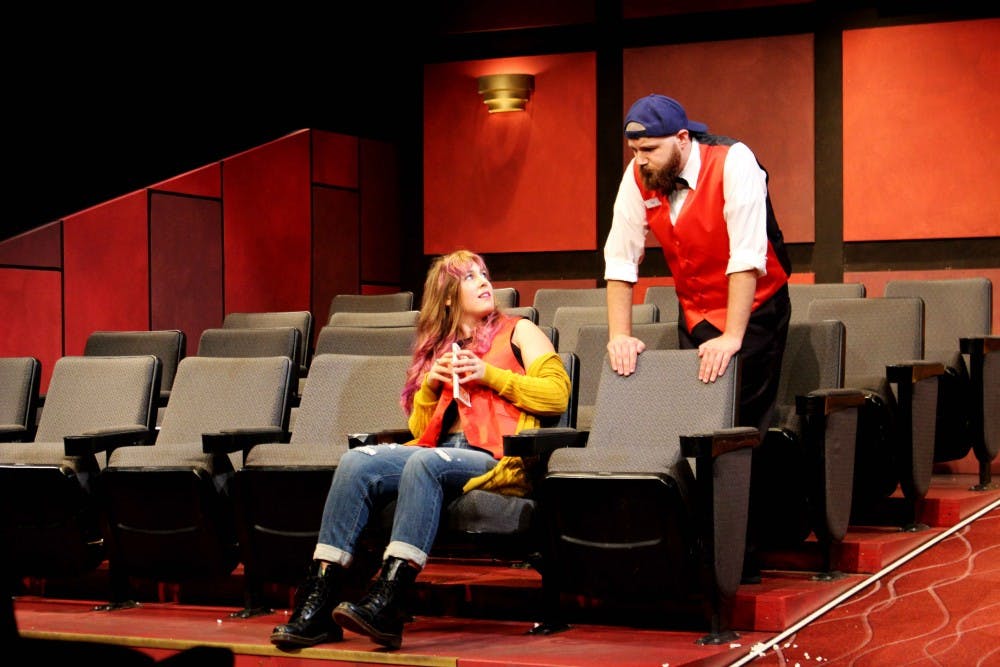The opening of "The Flick" appropriately mimicked the beginning of a movie. A single lamp flickered on and illuminated the back wall of Studio 88 with different colors simulating a projection. Brassy opening music swelled to a crescendo and the audience settled in for a unique slice-of-life story.
"The Flick," written by Annie Baker, is a bold choice for a production, and an even bolder choice to open the Department of Theatre's season. It tells the story of Sam, Rose and Avery, three employees of a neglected, old New England movie theater called The Flick. Sam is in his thirties, frustrated by both his job at the theater and his all-consuming attachment to Rose. Rose is a fun-loving, spontaneous girl in her twenties just trying to get by. Avery is a nervous college student taking a semester off, and the most passionate of the three about film. They are all searching for connection and authenticity, qualities reflected in The Flick's continued use of its old-fashioned projection system.
Despite winning a Pulitzer Prize in 2014, "The Flick" has not always been popular with its audiences. Baker typically writes with a sense of hyper-realism, which means that her works tend to feature long periods of silence in which characters go about their everyday lives.
In the production's program, Miami student and dramaturg Rachel O'Reilly acknowledges that "hyper-realism challenges the normal theatrical experience" and that "audience members are either fully engaged or leave the theater in a fit." Indeed, two students in front of me walked out of the show during one of the play's long silences.
However, in a world in which theatre often comes across as contrived and out-of-touch with the average person, "The Flick" is a much-needed and refreshing departure. Anyone who has spent at least a few months in any part-time job would recognize these occasionally awkward, oddly close relationships that form between coworkers, right down to the unrequited love and uncomfortable conversations surrounding race and class.
We all know a Rose, an Avery, a Sam. We've worked beside them before. We've all had a boss like Steve or, at least, we have all been irritated by our bosses in the same way The Flick's employees are irritated by Steve. While it can be disconcerting to be presented with a play that so closely resembles real life, it offers audiences a unique opportunity to reflect on their choices and actions.
The show was intensely layered and definitely meta. Even disregarding the "theater inside of a theater" aspect, the actors brushed uncomfortably close to self-awareness at times, which they handled skillfully. One such moment featured Sam, played by Ben Cobb, shouting "I'm not performing, I am not performing!" and Rose, played by Kate Herman, replying with "Then why aren't you facing me? Look at me." These lines easily could have seemed artificial, but all the actors deftly navigated this challenging work and still managed to avoid seeming too performative.
The technical aspects of the production were understated, but masterful. The mundanity of the props, like the yellow mop buckets and gray plastic trash cans, cemented the realism of "The Flick."
Lighting designer Cassie Mings returned to the Department of Theatre this year after her previous Miami work on "Bliss (or Emily Post is Dead)." Mings discussed the surprisingly meaningful transition from incandescent to fluorescent and LED lighting that occurred as The Flick changed ownership, switched from its old projector to digital cinematography and became The Venue. She wrote that "being able to capture how that looks and feels different, and how it represents the progression of time and technology on display in this work, is important to tell the story fully."
Though absolutely no change to the set was made, the vibe of the theatre was completely altered with the change in ownership, and the lighting scheme demonstrated that switch ingeniously.
After an emotionally charged performance, the lights dimmed in both theaters and "The Flick" was closed.
glynnee@miamioh.edu

